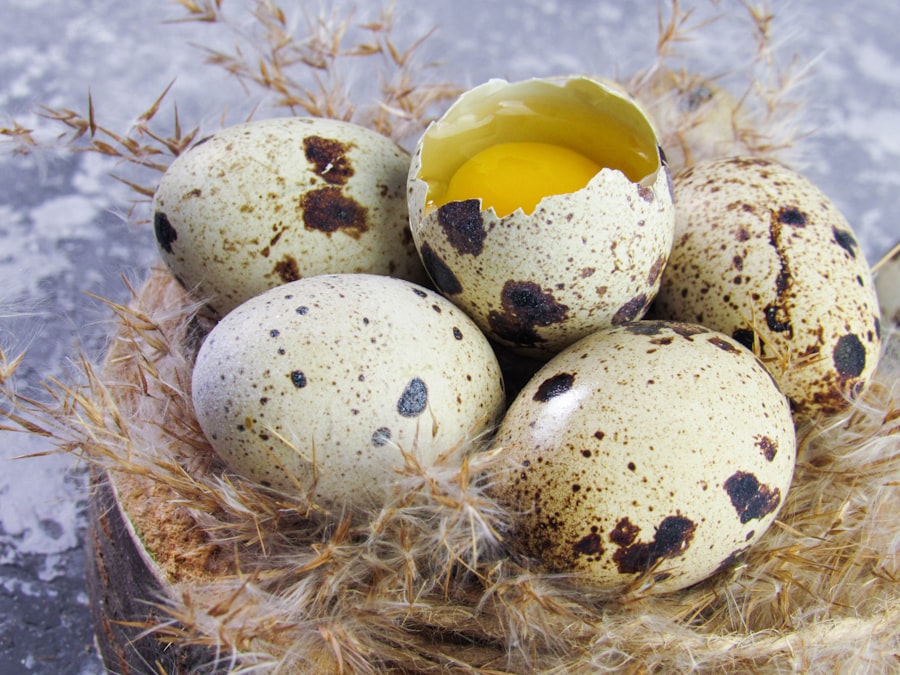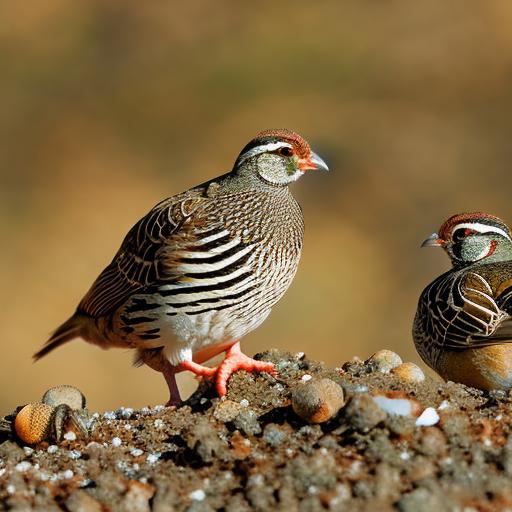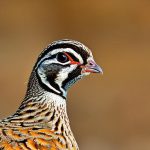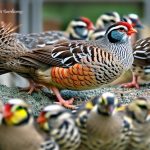Quail keeping has become increasingly popular in recent years, as these small birds are not only easy to care for but also provide a sustainable source of eggs and meat. Quails are known for their hardiness and adaptability, making them an ideal choice for both experienced and novice poultry keepers. They are also relatively low maintenance, requiring less space and resources compared to other poultry species. Quails are also known for their ability to lay eggs year-round, making them a valuable addition to any small farm or homestead.
Quail keeping can be a rewarding and enjoyable experience, as these birds are not only productive but also have endearing personalities. They are known for their curious and social nature, and many quail keepers find joy in observing their birds’ behaviors and interactions. Additionally, quails come in a variety of breeds and colors, making them an attractive addition to any poultry flock. Whether you are interested in quail keeping for eggs, meat, or simply as pets, there are many benefits to adding these charming birds to your homestead.
Key Takeaways
- Quail keeping is a rewarding hobby that requires proper knowledge and care.
- When choosing a quail breed, consider factors such as egg production, temperament, and space requirements.
- Quails require a secure and well-ventilated housing with access to clean water and proper bedding.
- A balanced diet with the right amount of protein and nutrients is essential for quail health and egg production.
- Proper handling and storage of quail eggs is crucial to maintain their freshness and quality.
Choosing the Right Quail Breed
When it comes to choosing the right quail breed for your needs, there are several factors to consider. Different quail breeds have varying characteristics, such as egg production, size, and temperament, so it’s important to select a breed that aligns with your goals and resources. For example, if you are primarily interested in egg production, Japanese quail (Coturnix japonica) are a popular choice due to their high egg-laying capacity and relatively small size. On the other hand, if you are interested in raising quail for meat, larger breeds such as the jumbo Coturnix or Bobwhite quail may be more suitable.
In addition to considering the purpose of your quail keeping venture, it’s important to take into account the climate and environment in which you will be keeping your birds. Some quail breeds are more cold-hardy, while others are better suited to warmer climates. It’s also important to consider the availability of specific quail breeds in your area, as well as any local regulations or restrictions that may impact your choice. By carefully researching and selecting the right quail breed for your specific circumstances, you can set yourself up for a successful and fulfilling quail keeping experience.
Housing and Care for Quails
Proper housing and care are essential for the health and well-being of quails. When it comes to housing, quails require a secure and predator-proof coop or aviary that provides adequate space for the birds to move around and exhibit natural behaviors. The coop should also be well-ventilated and provide protection from the elements, as well as nesting boxes for egg-laying. Additionally, it’s important to provide a suitable substrate, such as straw or wood shavings, for the quails to scratch and dust bathe in.
Quails also require a balanced diet and access to clean water at all times. A high-quality commercial quail feed can provide the essential nutrients and vitamins that quails need for optimal health and egg production. In addition to commercial feed, quails can also benefit from supplemental treats such as mealworms, fruits, and vegetables. It’s important to monitor the quails’ food intake and adjust their diet as needed based on their age, activity level, and overall health. By providing proper housing and nutrition, as well as regular health checks and preventative care, you can ensure that your quails thrive in their environment.
Feeding and Nutrition for Quails
Feeding and nutrition play a crucial role in the health and productivity of quails. A balanced diet is essential for supporting egg production, maintaining healthy feathers, and overall well-being. Commercial quail feed is formulated to provide the essential nutrients, vitamins, and minerals that quails need for optimal health and egg production. It’s important to choose a high-quality feed that is specifically designed for quails, as this will ensure that they receive the proper balance of protein, carbohydrates, fats, and other essential nutrients.
In addition to commercial feed, quails can also benefit from supplemental treats such as mealworms, fruits, vegetables, and grains. These treats can provide variety in their diet and serve as enrichment for the birds. It’s important to offer treats in moderation and avoid feeding them foods that are harmful or toxic to quails. Additionally, providing access to clean water at all times is essential for quail health and hydration. Water should be provided in shallow containers that are easy for the quails to access without the risk of drowning.
By paying close attention to the feeding and nutrition of your quails, you can support their overall health and productivity. Monitoring their food intake, adjusting their diet based on their needs, and providing a clean and safe feeding environment are all important aspects of caring for quails.
Collecting and Storing Quail Eggs
Quail eggs are not only nutritious but also have a delicate flavor that makes them a popular choice for culinary use. When it comes to collecting quail eggs, it’s important to establish a routine that ensures the eggs are gathered promptly to prevent breakage or spoilage. Quails typically lay their eggs in the morning hours, so it’s best to check for eggs early in the day to ensure they are collected fresh. It’s important to handle the eggs with care to avoid cracking or damaging the delicate shells.
Once collected, quail eggs should be stored in a cool and dry environment to maintain their freshness. They can be stored at room temperature for up to a week or refrigerated for longer shelf life. It’s important to store the eggs with the pointed end facing downward to help preserve their quality. Before using quail eggs for cooking or baking, it’s recommended to allow them to come to room temperature for best results.
By establishing a routine for collecting and storing quail eggs, you can ensure that they remain fresh and flavorful for culinary use. Whether you enjoy them scrambled, boiled, or incorporated into baked goods, quail eggs are a versatile and nutritious addition to any kitchen.
Health and Disease Management for Quails

Maintaining the health of your quails is essential for their well-being and productivity. Regular health checks and preventative measures can help identify any potential issues early on and prevent the spread of disease within the flock. It’s important to observe your quails regularly for any signs of illness or injury, such as changes in behavior, decreased appetite, or abnormal droppings.
In addition to regular observation, providing a clean and well-maintained living environment is crucial for preventing disease in quails. This includes regularly cleaning the coop or aviary, providing fresh bedding, and ensuring access to clean water at all times. Additionally, practicing good biosecurity measures can help prevent the introduction of disease into your flock. This includes quarantining new birds before introducing them to existing ones, as well as limiting exposure to wild birds or other potential sources of infection.
In the event that a quail becomes ill or injured, it’s important to seek veterinary care from a professional with experience in poultry medicine. Prompt diagnosis and treatment can help prevent the spread of disease within the flock and improve the chances of recovery for the affected bird. By prioritizing preventative care and prompt treatment when needed, you can help ensure that your quails remain healthy and productive.
Tips for Maximizing Egg Production
Maximizing egg production is a common goal for many quail keepers, whether they are raising quails for personal use or commercial purposes. There are several strategies that can help increase egg production in quails. Providing a high-quality diet that is specifically formulated for egg-laying quails is essential for supporting optimal egg production. This includes ensuring that the feed provides the necessary nutrients and vitamins needed for healthy egg development.
In addition to nutrition, creating a stress-free environment can also help maximize egg production in quails. This includes providing adequate space in the coop or aviary, minimizing disturbances from predators or other animals, and maintaining a consistent lighting schedule. Many quail keepers use artificial lighting to extend the hours of daylight during the winter months when natural daylight is limited. This can help stimulate egg production during periods of reduced daylight.
Finally, selecting high-producing quail breeds can also contribute to maximizing egg production in your flock. Japanese quail (Coturnix japonica) are known for their prolific egg-laying capacity and are a popular choice for those seeking high egg production. By implementing these strategies and paying close attention to the needs of your quails, you can help maximize egg production in your flock.
In conclusion, quail keeping offers a range of benefits including a sustainable source of eggs and meat as well as being relatively low maintenance compared to other poultry species. When choosing a breed it is important to consider factors such as egg production capacity size temperament climate availability local regulations or restrictions which may impact your choice. Proper housing care balanced diet clean water at all times regular health checks preventative care will ensure that your quails thrive in their environment.
Feeding plays a crucial role in the health productivity of quails commercial feed is formulated with essential nutrients vitamins minerals necessary for optimal health egg production supplemental treats such as mealworms fruits vegetables grains provide variety enrichment water should be provided in shallow containers easy access without risk of drowning.
Quail eggs are nutritious delicate flavor popular culinary use establish routine collecting storing eggs ensure freshness stored cool dry environment room temperature refrigerated longer shelf life store pointed end facing downward before using allow come room temperature best results.
Maintaining health regular checks preventative measures identify potential issues early prevent spread disease within flock observe regularly signs illness injury changes behavior decreased appetite abnormal droppings clean well-maintained living environment crucial preventing disease good biosecurity measures quarantining new birds limiting exposure wild birds seek veterinary care professional experience poultry medicine.
Maximizing egg production common goal many strategies include high-quality diet stress-free environment consistent lighting schedule selecting high-producing breeds Japanese quail known prolific egg-laying capacity popular choice implementing strategies paying close attention needs help maximize egg production flock.
Maximizing egg production is a common goal for many poultry farmers. Strategies to achieve this goal include providing a high-quality diet, creating a stress-free environment, maintaining a consistent lighting schedule, and selecting high-producing breeds such as Japanese quail, known for their prolific egg-laying capacity. Implementing these strategies and paying close attention to the needs of the flock can help maximize egg production.
If you’re interested in keeping quails for eggs, you might also want to check out this insightful article on creating a comfortable and functional interior for your chicken coop at Poultry Wizard. A well-designed coop interior can contribute to the overall health and productivity of your quails, ensuring a conducive environment for egg-laying.
FAQs
What are quails?
Quails are small ground-dwelling birds that are often kept for their eggs and meat. They are known for their small size and gentle nature, making them popular for backyard poultry keeping.
What do quail eggs taste like?
Quail eggs have a rich and creamy flavor, with a slightly stronger taste compared to chicken eggs. They are often described as having a more intense flavor and a higher yolk to white ratio.
How many eggs do quails lay?
Quails are prolific layers and can lay up to 300 eggs per year, depending on the breed and environmental conditions. They typically start laying eggs at around 6-8 weeks of age and continue to lay consistently throughout their first year.
What do quails eat?
Quails are omnivores and eat a diet that consists of commercial quail feed, grains, seeds, insects, and green leafy vegetables. It’s important to provide them with a balanced diet to ensure optimal egg production and overall health.
How much space do quails need?
Quails are small birds and don’t require a lot of space. A general rule of thumb is to provide at least 1 square foot of space per quail in a coop or enclosure. They also benefit from access to an outdoor run for foraging and exercise.
Are quails easy to care for?
Quails are relatively easy to care for, as they are hardy and low-maintenance birds. They require a clean and secure living environment, regular access to food and water, and protection from predators. With proper care, they can thrive and provide a steady supply of eggs.
Meet Walter, the feathered-friend fanatic of Florida! Nestled in the sunshine state, Walter struts through life with his feathered companions, clucking his way to happiness. With a coop that’s fancier than a five-star hotel, he’s the Don Juan of the chicken world. When he’s not teaching his hens to do the cha-cha, you’ll find him in a heated debate with his prized rooster, Sir Clucks-a-Lot. Walter’s poultry passion is no yolk; he’s the sunny-side-up guy you never knew you needed in your flock of friends!







